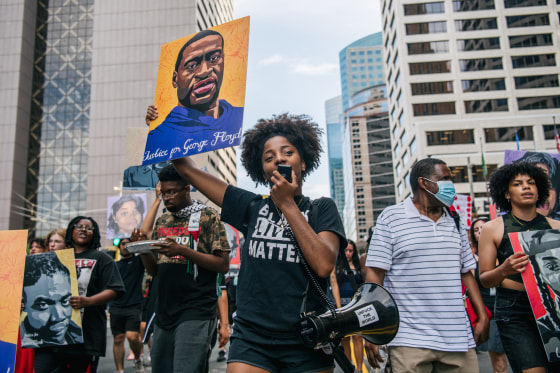WASHINGTON — A shifting political climate, several blown deadlines and a collapsed deal are dimming prospects that Congress can pass legislation to make sweeping changes to policing policies.
Bipartisan negotiators aren't giving up, but they are increasingly talking about abandoning thornier issues and moving forward with a slimmed-down bill that would accomplish the pieces of police reform that already have consensus.
The Senate left town for its August recess Wednesday morning, and two lead negotiators on police reform, Sens. Tim Scott, R-S.C., and Cory Booker, D-N.J., missed another self-imposed deadline after five months of talks failed to reach a deal.
"The good news is we've not resigned ourselves to stopping. We believe there's still a path forward, so that's really good news," Scott told NBC News late Tuesday.
The group — Scott, Booker and Rep. Karen Bass, D-Calif. — began its work amid national outrage over the murder of George Floyd, the 46-year-old Black man who died last year after a white Minneapolis police officer knelt on his neck for 9 minutes and 29 seconds.
After the deaths of Floyd and Breonna Taylor in Louisville, Kentucky, racial justice protests put immense and sustained pressure on lawmakers to hold police more accountable. The White House had set a goal of passing federal legislation named for Floyd by the first anniversary of his murder in May, then backed off it when it became clear negotiators needed more time. Meanwhile, some cities have seen spikes in violent crime, and Republicans looking ahead to next year's midterm elections are ramping up their attacks on Democrats, falsely claiming that the party on the whole wants to "defund the police."
The negotiators at one point this summer had a deal within reach, but it fell apart, and the discussions since then have been painfully slow and tedious, with little progress, people familiar with the discussions say.
A deal was close in early June, when Booker gained the support of the Fraternal Order of Police for changes to qualified immunity. But Scott, who had previously told Booker that he would support what he could get police to support, walked away, saying he couldn't support it if sheriff's associations weren't on board.
"There was a moment," said John Thune of South Dakota, the second-ranking Senate Republican. "I thought they had a bead on it, but then it kind of fell apart."
Reflecting the frustration after months of intense haggling without substantial progress, Scott last month laid down a new marker: If they hadn't reached a deal by the August recess, there was no point in keeping on talking. As recently as last week, Scott refused to commit more time to negotiations.
But now that the deadline has arrived, he isn't willing to give up, and lawmakers are considering leaving the most contentious parts of the bill for another day, an idea likely to cause consternation.
"We will take a look at all options. And that means that we could have a smaller bill," Scott said in an interview.
One main component that could be left on the chopping block is qualified immunity, the legal doctrine that limits lawsuits against police officers, which continues to stump negotiators, an aide familiar with the negotiations said. The criminal standard to prosecute officers for use of force is another major sticking point.
Booker didn't dismiss the option of a "skinny" bill, saying, "We're working to get as much as we can done that's meaningful, substantive and brings accountability and transparency to policing."
A skinny bill comes with its own challenges. Ending qualified immunity for police officers is a primary goal of civil rights groups, and dropping it from the bill might imperil the support of the White House and progressive Democrats who have insisted on it.
Issues that are mostly settled include limits on chokeholds, carotid holds and "no-knock" warrants, national standards for policing, record-keeping of misconduct and resources for police mental health.
And while Scott's Senate re-election in South Carolina is all but guaranteed — and he is in a unique position in his party as the only Black Republican senator who has also detailed his personal experience with police, including being pulled over for "driving while Black" — the vote becomes more difficult for other Republicans as the midterms approach.
"The momentum has absolutely slowed," Republican strategist Matt Gorman said.
Thune said, "I think there may be a chance for a shot at something bipartisan again, but it'll depend on timing, and it'll depend on some willingness to compromise on both sides."

